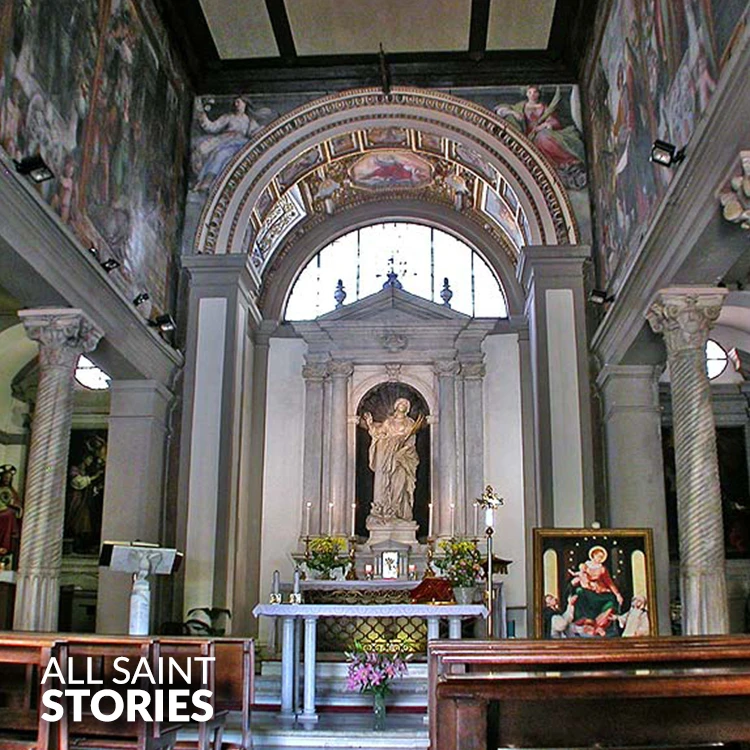"Saint Bibiana, faithful servant of God, You endured great suffering for your faith. Intercede for us, that we may remain strong in our beliefs, And persevere in the face of trials. Pray for our healing, strength, and protection, That we may live with the courage and faith you exemplified. Amen."
ST. BIBIANA (MARTYR, VIRGIN)
ST. BIBIANA (MARTYR, VIRGIN)

St. Bibiana was a Roman virgin and martyr who suffered persecution under Emperor Julian the Apostate. She remained steadfast in her faith despite imprisonment and torture. After refusing to renounce Christianity, she was scourged to death. Her relics are enshrined in the Basilica of St. Bibiana in Rome, where many miracles have been reported.
St. Bibiana was born in Rome during the 4th century to a devout Christian family. Her parents, Flavian and Dafrosa, were known for their strong faith, and their household was deeply committed to Christianity. However, this was a time of great persecution under Emperor Julian the Apostate, who sought to restore paganism and suppress Christianity.
Her father, Flavian, a former Roman prefect, was arrested for being a Christian. He was cruelly tortured and then exiled, where he later died as a martyr. Her mother, Dafrosa, suffered a similar fate—she was beheaded for her faith. Left orphaned, Bibiana and her sister, Demetria, continued to uphold their Christian beliefs despite the threats against them.
The sisters were soon arrested and brought before Apronianus, the Roman governor. Demetria, after professing her faith, collapsed and died instantly, either from shock or divine intervention. Bibiana, however, was sentenced to a prolonged period of torture. She was handed over to a woman named Rufina, who attempted to corrupt her morals and force her into a life of sin. Bibiana resisted all temptations, remaining faithful to Christ.
Frustrated by her steadfastness, Apronianus ordered that she be tied to a pillar and scourged with leaded whips. She endured this brutal torture with unwavering faith and joy, refusing to renounce Christ. Eventually, she succumbed to her wounds and died on December 2, around the year 361 AD. Her body was left unburied to be devoured by wild animals, but miraculously, it remained untouched. After two days, fellow Christians secretly retrieved and buried her remains near her family’s home.
Years later, during the reign of Pope Simplicius (468–483), a basilica was built in her honor on the site of her burial. The Basilica of St. Bibiana in Rome remains a place of pilgrimage, where many miracles, particularly healings of mental and neurological disorders, have been reported through her intercession.
St. Bibiana is honored as a virgin and martyr of the Church. Her life exemplifies courage, purity, and unwavering faith in the face of persecution. She continues to be invoked for healing and protection against various afflictions, especially epilepsy, headaches, and mental illnesses.
Video Not Found
The information on this website is compiled from various trusted sources. While we aim for accuracy, some details may be incomplete or contain discrepancies.
If you notice any errors or have additional information about this saint, please use the form on the left to share your suggestions. Your input helps us improve and maintain reliable content for everyone.
All submissions are reviewed carefully, and your personal details will remain confidential. Thank you for contributing to the accuracy and value of this resource.
Credits & Acknowledgments
- Anudina Visudhar (Malayalam) – Life of Saints for Everyday
by Msgr. Thomas Moothedan, M.A., D.D. - Saint Companions for Each Day
by A. J. M. Mausolfe & J. K. Mausolfe - US Catholic (Faith in Real Life) – Informational articles
- Wikipedia – General reference content and images
- Anastpaul.com – Saint images and reflections
- Pravachaka Sabdam (Malayalam) – Saint-related content and insights
We sincerely thank these authors and platforms for their valuable contributions. If we have unintentionally missed any attribution, please notify us, and we will make the correction promptly.
If you have any suggestion about ST. BIBIANA (MARTYR, VIRGIN)
Your suggestion will help improve the information about this saint. Your details will not be disclosed anywhere.
© 2026 Copyright @ www.allsaintstories.com






 English
English
 Italian
Italian
 French
French
 Spanish
Spanish
 Malayalam
Malayalam
 Russian
Russian
 Korean
Korean
 Sinhala
Sinhala
 Japanese
Japanese
 Arabic
Arabic
 Portuguese
Portuguese
 Bantu
Bantu
 Greek
Greek
 German
German
 Dutch
Dutch
 Filipino
Filipino